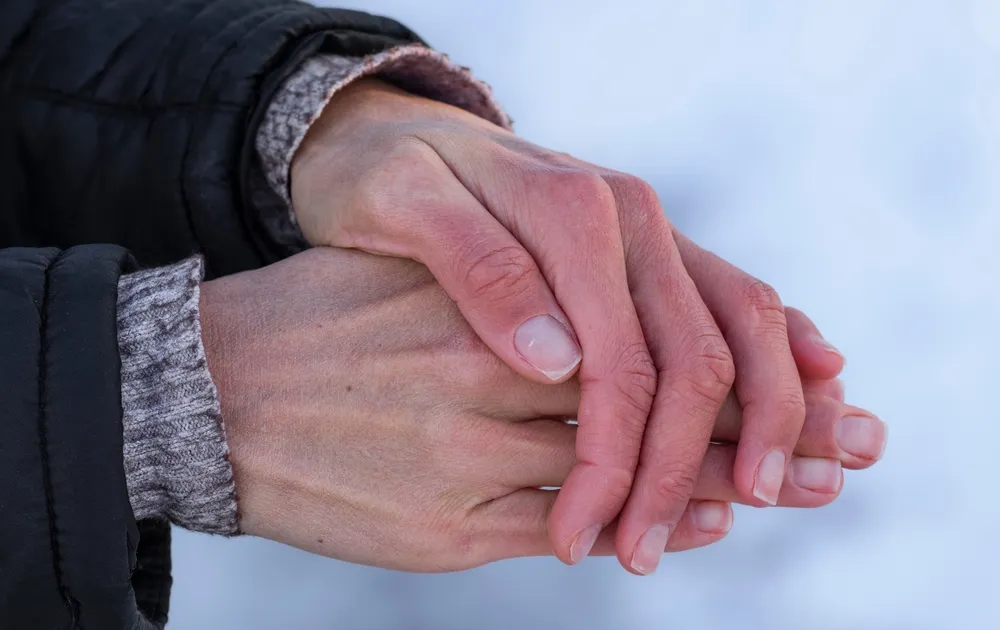As the days get shorter and the temperature drops, skin can start feeling tight and dry. Winter air tends to strip away moisture, leaving skin vulnerable to redness and irritation. The cold season can be particularly challenging for those with sensitive skin. Fortunately, a few strategies can help keep your skin soft and resilient against the elements this winter.
 Shutterstock: movchanzemtsova
Shutterstock: movchanzemtsovaWhy Winter Weather Can Be Harsh on Skin
Winter brings a host of environmental changes that may impact your skin’s health. Cold air contains less moisture, which can cause dehydration and dryness, often exacerbated by indoor heating that saps the skin’s natural oils. Wind exposure is another factor, potentially leading to redness and sensitivity, while low temperatures may even constrict blood vessels, reducing circulation to the skin’s surface. Together, these elements can weaken your skin’s barrier, making it more susceptible to flakiness and irritation.
Switch to Richer Moisturizers
If winter skin troubles you, using richer moisturizers can help. Moisturizers with humectants, like glycerin or hyaluronic acid, can bind moisture to the skin, while emollients can help smooth the skin’s surface. Occlusives, such as petroleum jelly, can provide a protective layer that seals in moisture. Applying moisturizers immediately after bathing is often beneficial, as this can help lock in hydration. While lotions may cut it the rest of the year, richer creams and ointments can offer added protection during colder months.
Say No to Hot Showers
Although hot showers and baths sound tempting on chilly days, they can actually dry out your skin. Prolonged exposure to hot water can strip away natural oils, leaving your skin more prone to irritation and dehydration. Opting for lukewarm water could help your skin retain its protective oils. If you find it difficult to give up hot showers entirely, consider keeping them shorter to reduce potential dryness.
Keep Hydrating, Inside and Out
Drinking enough water is essential no matter the season, and winter is no exception. Cold air often tricks people into thinking they need less hydration, but indoor heating and dry environments cause moisture loss. Sipping water consistently can support your skin’s hydration from within.
Cover Up and Keep Cozy
Winter clothing doesn’t just keep you warm; it can help protect your skin, too. Covering exposed skin, such as your hands and face, can help prevent excessive dryness and shield against harsh winds. Gloves, scarves, and hats are easy ways to add a layer of protection and can reduce windburn and redness.
Go Easy on Exfoliation
Exfoliation can be beneficial, but it’s wise to approach it cautiously. Harsh exfoliants may strip your skin, potentially leaving it raw or sensitive to cold air. Switching to a gentle exfoliator and reducing frequency could help maintain your skin’s protective barrier. Mild exfoliation can be enough to prevent buildup and reveal smoother skin without overdoing it.
Don’t Skip Sunscreen
Sun protection isn’t just for summer; UV rays can still impact skin in winter. Even on overcast days, UV radiation penetrates clouds and reflects off snow, which can lead to skin damage. Applying a broad-spectrum sunscreen daily can shield your skin from these effects. It can be beneficial to look for sunscreens with moisturizing ingredients to give your skin an extra hydration boost during the colder months.
Keep Indoor Temperatures Cool
While it’s natural to turn up the thermostat when it’s cold, high indoor temperatures may contribute to skin dryness. Excessive indoor heat can deplete moisture from the air, which can make your skin feel tight and irritated. Keeping indoor temperatures cool and using a humidifier can help offer a balance, providing a more comfortable indoor environment that supports skin hydration.
Consider Using a Humidifier
Dry indoor air could be one of winter’s biggest challenges for skin health. Using a humidifier in your living space may help add moisture back into the air, creating a more skin-friendly environment. Humidifiers can be particularly helpful at night, potentially reducing the likelihood of waking up with dry, flaky skin.
Keep Your Lips Soft With Balm
Winter air can make lips chapped and uncomfortable, so keeping them moisturized is essential. Lip balms with hydrating ingredients, like shea butter or beeswax, can create a barrier against cold air while adding essential moisture. Applying lip balm frequently, especially before going outdoors, can help prevent dryness. Choosing a balm with SPF can also provide extra protection from UV rays.
Seek Professional Advice
If your skin struggles to adapt to winter, a dermatologist can offer guidance on managing dryness and irritation. Persistent issues like eczema or cracked skin could benefit from professional care, as tailored treatments can often offer better results. Dermatologists can recommend products or treatments suited to your skin type and concerns, which can make winter skincare more effective and manageable.
Embrace Seasonal Skincare Adjustments
Preparing your skin for cold weather doesn’t have to be complicated. By incorporating simple habits and focusing on hydration and protection, you may find winter skincare becomes an easy addition to your routine. Staying mindful of seasonal changes and adapting your skincare approach can help you protect your skin this winter.
